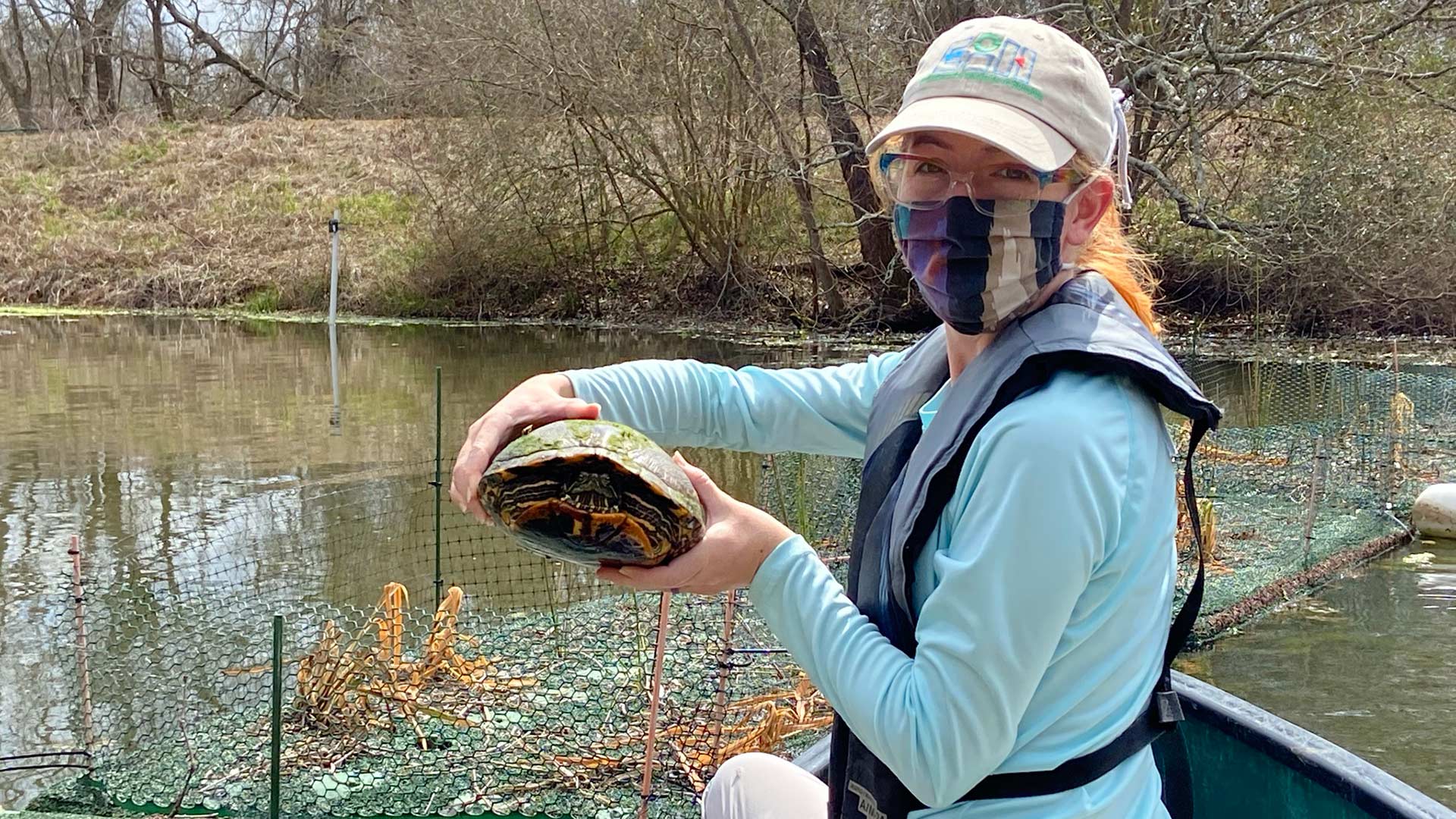- Future Students
- How to Apply
- Visit UHCL
- Admitted Students
- Tuition, Costs and Aid
- Degrees and Programs
- Contact Admissions
- Current Students
- Class Schedule
- Academic Calendar
- Advising
- Events
- Library
- Academic Resources and Support
- Student Services and Resources
- Alumni
- Lifetime Membership
- Alumni Events
- Update Your information
- Awards and Recognitions
- Give to UHCL
For local waterways, floating wetlands offer filtration power
May 4, 2021 | UHCL Staff

Talk about an incredible flotation device. These rafts look like they're just floating quietly in the middle of a waterway, with a lot of leafy green plants and an occasional turtle or small alligator basking on board. But below the surface, says Kaylei Chau, who is working toward her Master of Science in Environmental Science at University of Houston-Clear Lake, is where all the action is taking place.
Constructed, floating wetlands are recognized as proven, effective water treatment systems that provide a natural way of removing harmful pollutants and unwanted nutrients. "I'm just hung up on the wetlands' ability to clean the water," Chau said.
"(Executive Director of the Environmental Institute of Houston and Professor of Environmental Science) George Guillen, who is my adviser, said he had proposed a floating treatment wetlands study to the Harris County Flood Control District, which was accepted in 2019," she said. "It was exactly in line with what I hope to do. I'm really interested in green infrastructure and sustainable solutions. This study has become my Capstone project for my master's degree."
There are four types of floating wetlands overall; three of them are deployed in Potter Pond on the UH-Clear Lake campus. "We are testing them all to see how well each type filters water. I designed the mats in Alligator Pond myself to see how feasible it was to make them," she said.
Floating wetlands, explained Chau, involves taking a floating structure and planting native wetland plants inside. "These particular plants filter out excessive nutrients that are caused from agricultural runoff," she said. "Too many of those nutrients get in the water and affect its quality. These plants are great at sequestering those nutrients as well as heavy metals and other pollutants."
The theory is, she continued, that if you put these wetland plants on floating structures, they'll rise and fall with extreme water level changes. "You can have them covering a whole basin, or have them just for a slight treatment, or even just aesthetic value. Your surface area is your limit," she said.
Although there have been many setbacks due to COVID-19, Chau said the data she collects will be given to the Houston Flood Control District so they can determine these wetlands' value in all storm water basins.
"The biggest thing I've learned from this project is how amazing these wetland plants are," Chau said. "I'm testing different species, and some are known to do very well in this system. I've taken plants that are known to be successful and they're just made for this."
She added that wetlands might be perceived as unpleasant swampy areas, they shouldn't be destroyed or developed.
"People don't realize how important wetlands are for water quality and flood control, which we need desperately here," she said. "During the winter, the plants die back, and in order to survive, they need robust underwater root systems, because those roots act as 'uptakers' of the excess nutrients we don't want in the water. Where rivers flow into bay systems, they will flow first through wetlands, which are like nature's filter for the water."
She said that the study she's conducting in Potter Pond will inform the recommendations she'll make to the Houston Flood Control District, and also be used in a larger study in the Harris County Flood Control Districts in one of the storm water basins currently being built.
"They've consulted with us before construction about the best design to build that basin for wetlands," she said. "This pilot study that I'm currently conducting here will be used to recommend what we do in the large-scale study in their flood control district basin."
Chau, who works full time at the EIH as she's completing her graduate studies, said she will stay with this project even after she receives her degree next May. "I love it here and the work we do," she said, "I would like to stay at least until the large-scale study is complete."
For more information about UHCL's Environmental Science program, go online.






